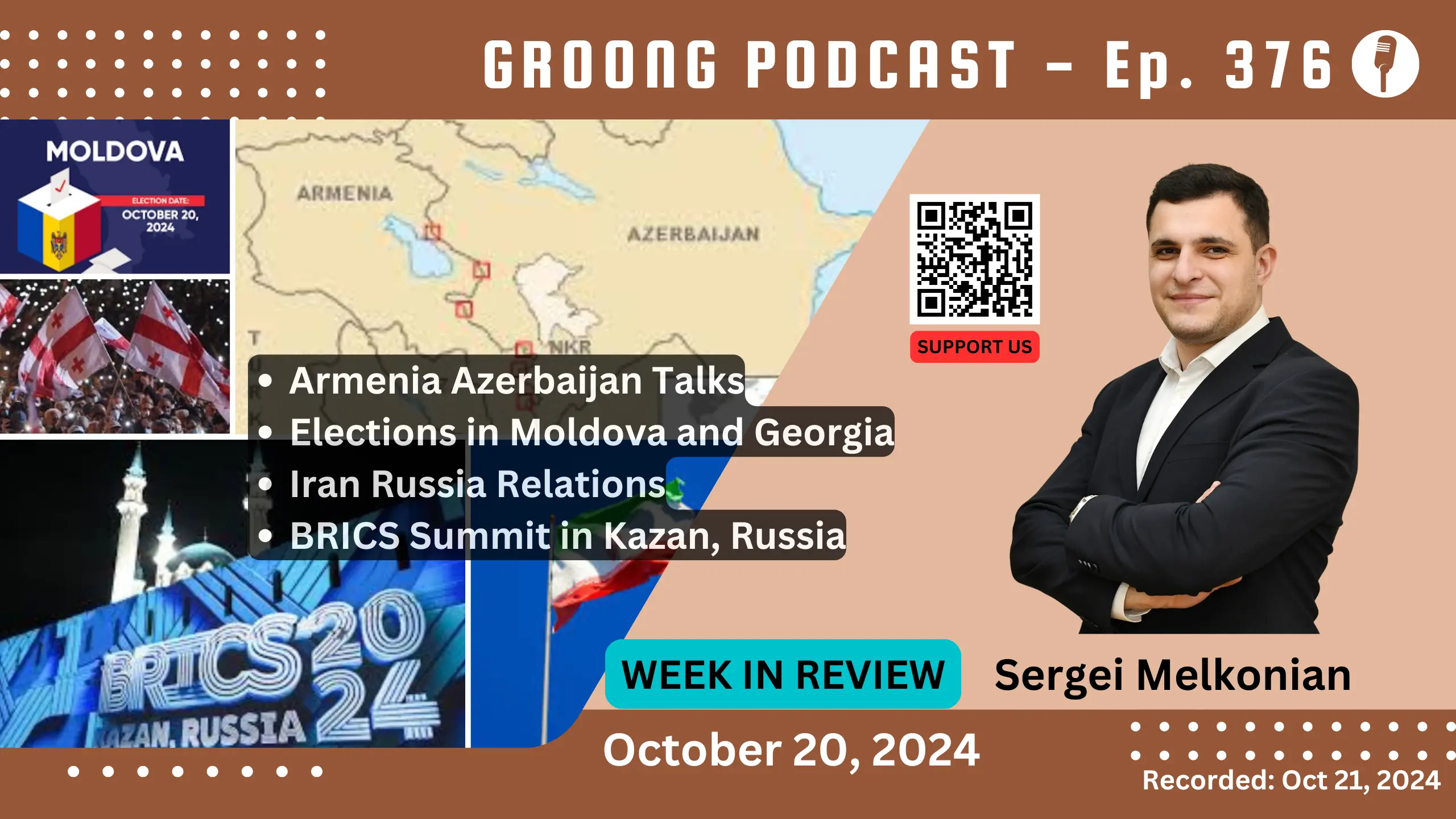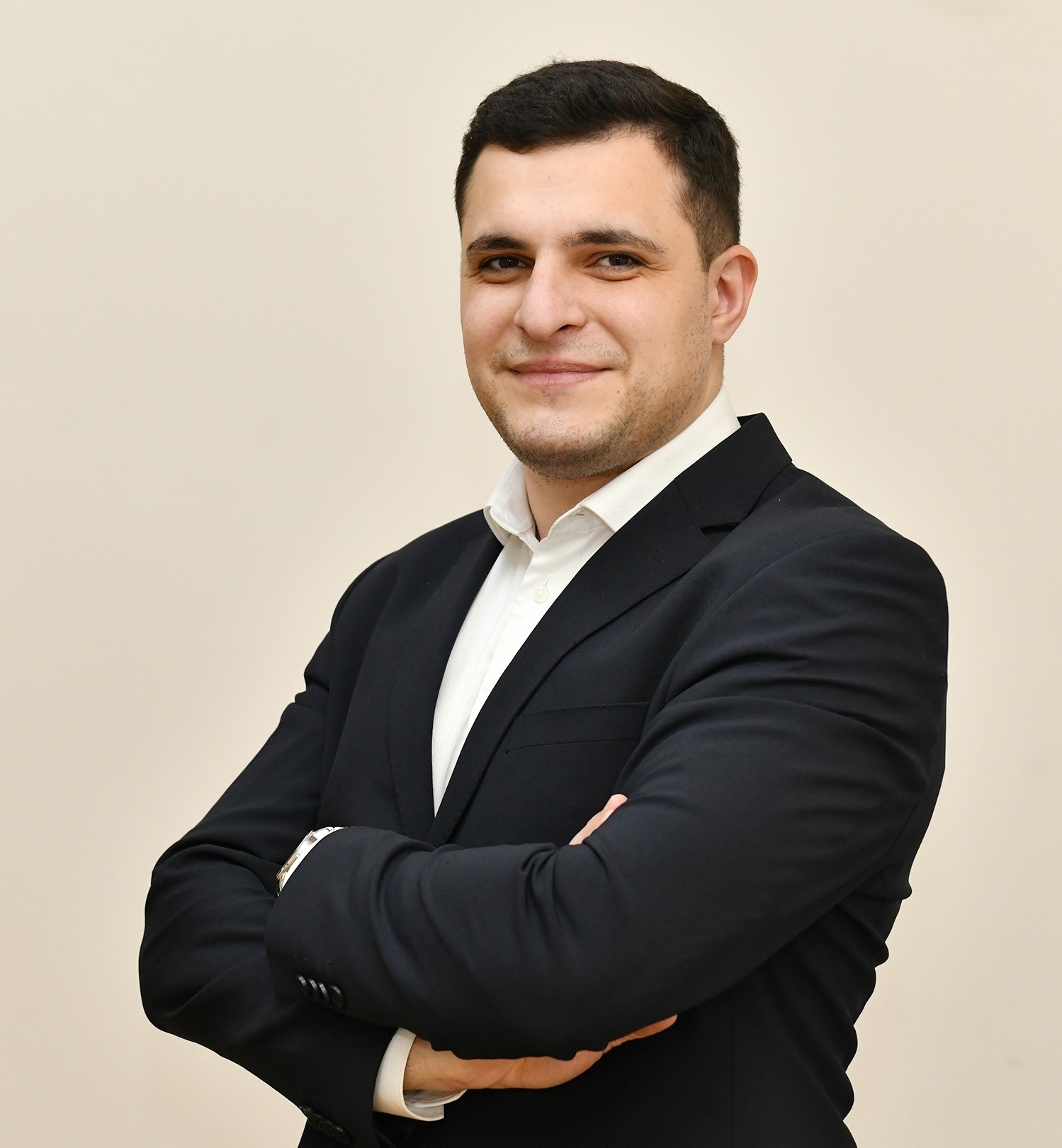
Groong Links:
Guest:
Topics:
- Armenia Azerbaijan Talks
- Elections in Moldova and Georgia
- Iran Russia Relations
- BRICS Summit in Kaza, Russia
Episode 376 | Recorded: October 20, 2024
Show Notes
Armenian Azerbaijani Talks
3+3 Meeting In Istanbul
After Moscow and Tehran, this year it was Istanbul’s turn to hold the third meeting of the so-called “3+3” platform, which took place this past week. During the summit, Mirzoyan met with Bayramov, as part of the current bilateral format of meetings.
We’re not aware of any results, at least none were reported, but the “Big 3”, Russia, Turkey and Iran proposed to Armenia and Azerbaijan to move their “peace process” negotiations to the 3+3, in order to achieve a regional solution. At this time neither Armenia nor Azerbaijan have responded to the offer.
We’re not sure what else was discussed, but the Armenia-Azerbaijan process seems to have been the most dominant topic for this year’s 3+3 summit.
Questions:
- What are the prospects for Armenia and Azerbaijan agreeing to move negotiations under the auspices of 3+3? Would such a move be advantageous, or disadvantageous for Armenia?
- Another Turkish agenda for this meeting seems to have been for Turkey and Azerbaijan to work on softening Iran’s red lines regarding their so-called “Zangezur corridor”. Are there scenarios in which we could see Iran compromising on its border with Armenia?
- We know in the past, various superpowers have offered to mediate the process. From the mediator’s perspective, why is having the “peace process” under the auspices of the West or Russia or now the 3+3 so important?
- What other major topics were on the 3+3 agenda?
Artsakh Armenian Repatriation?
This past week Maria Zakharova, the spokeswoman for the Russian MFA, stated that there was, and still is an open opportunity for Artsakh’s Armenians to repatriate to their homes. She went on to praise Azerbaijan’s “constructive approach” to allow Armenians to move back to their homes.
Needless to say, absolutely nobody expects Artsakh Armenians to move their families back into killing fields, and risk genocide. Not the Russians, not the Azeris, not the Armenians, or Artsakhtsis, nor anyone in the west.
Questions:
- What are the politics behind this claim by Zakharova?
- Is this a red herring topic? Is this a carrot to the Armenian leadership? Or is this a blame-shifting tactic because both countries have a heavy responsibility in the total ethnic cleansing of Artsakh?
- Under what political circumstances could, or would Armenians move back to their homes in Artsakh?
Elections in Moldova and Georgia
Moldova was holding parliamentary elections yesterday, October 20, 2024. Georgia will hold them over this coming weekend, on October 26.
Questions:
- What are the main outcome scenarios?
- How do they affect the geopolitics around the South Caucasus?
Russia - Iran Relations
The presidents of Iran and Russia met in Turkmenistan 10 days ago. It appears to have been scheduled as a quick touch base ahead of the BRICS summit in Kazan where it is anticipated that a new strategic partnership agreement may be signed. Putin said: “our assessments of current events in the world are often very close”.
This is happening in the backdrop of a major potential regional escalation. We know that currently Iran is bracing for a “lethal” and “surprising” attack promised by Israel. Depending on how big the attack is, there are predictions of a major regional war looming. Which makes the dynamics of the Russia-Iran relations all the more interesting.
On the ground, in the Caucasus, it seems that Russia and Iran have publicly disagreed at least on one aspect, which is the communications between Azerbaijan and Nakhijevan via Armenia, the infamous point #9 of the November 9-10 statement.
Questions:
- What areas do Russia and Iran agree on, and more importantly, disagree on?
- How do developments in the war in Gaza and Israel affect the relationship between Russia and Iran?
- Does the potential strategic partnership agreement include a military component?
Likelihood of a Major Israeli Attack on Iran
After significant blows to Hamas and Hezbollah leadership, the pager attacks, the Haniyeh assassination in Tehran, etc. Israel has been bombing South Lebanon and Beirut. Some analysts say that the assassinations of Hamas and Hezbollah leaders have left Iran weakened and exposed, and Israel has basically dared them into a direct confrontation.
Questions:
- Does Iran have any red lines in the Middle East, and does it want direct confrontation with Israel?
- The bombing of Lebanon represents a major escalation already, do you see the Gaza war expanding further?
- For example, Israel has been talking about a direct attack on Iran’s nuclear facilities, or its energy infrastructure.
- What is Russia’s perspective on the expanding crisis around Israel?
Azerbaijan provides Israel with 40% of its oil. Despite the ongoing war, Israel continues to heavily arm Azerbaijan. So this is a symbiotic relationship between two rabidly aggressive states.
Questions:
- What expectations of Azerbaijan does Israel have, should its conflict with Iran flare up into a direct war?
- What dangers does it pose for Armenia?
BRICS Summit
This week the 16th annual BRICS summit is due to take place in Kazan, Russia. (Starts tomorrow.) There are some new membership applications, among them Azerbaijan’s. Armenia will attend as an observer; Pashinyan and Putin are expected to meet on the sidelines of the summit.
BRICS is not a military alliance, it’s more of a loosely coupled grouping of countries that are concerned about the economic hegemony of the west, the dollar, the weaponization of sanctions, etc.
Questions:
- First, how would you characterize what BRICS is?
- What are the key agenda items on the summit’s radar?
- Why is Turkey hedging its bets and has not yet applied for membership?
- Should small countries like Armenia and Georgia consider joining BRICS?
- What would be the advantages or disadvantages?
- Should Armenia be worried about Azerbaijan joining BRICS?
Thoughts from the Participants
- Hovik: Armenian POWs and hostages are still in Azerbaijan. Actively demand their release, tweet with hashtag #COP29
- Where are Pashinyan & Anna Hakobyan’s “11,000 deserters and traitors” who lost the 44-day war?
- Sergei: Azerbaijani parliament formed a committee on “Western Azerbaijan”, where is the response?
- Demand the return of Artsakh Armenians. Our Nation must preserve its long memory and stick to its values and agenda.
Wrap-up
That’s our Week in Review, we hope you found it helpful. We invite your feedback and your suggestions under our Youtube videos, and you can find us on most social media and podcast platforms. Thanks to Laura Osborn for the music on our podcasts.
Thanks to Laura Osborn for the music on our podcasts.
Guests

Sergei Melkonian
Dr. Sergei Melkonian is currently a Research Fellow at APRI Armenia, a Yerevan-based think tank. He served as assistant to President of Armenia, Armen Sarkissian, on foreign policy (Middle East and post-Soviet space). Sergei is also a guest lecturer at Yerevan State University and the Russian-Armenian University.
Hosts

Hovik Manucharyan
Hovik Manucharyan is an information security engineer who moved from Seattle to Armenia in 2022. He co-founded the ANN/Groong podcast in 2020 and has been a contributor to Groong News since the late 1990s.
Disclaimer: The views expressed by Hovik Manucharyan on the ANN/Groong podcast are his own and do not necessarily reflect the opinions of his employer or any other organization.

Asbed Bedrossian
Asbed Bedrossian is an IT professional, and for years oversaw the central IT enterprise infrastructure and services at USC. His decades of experience spanned across IT strategy, enterprise architecture, infrastructure, cybersecurity, enterprise applications, data center operations, high performance computing, ITSM, ITPM, and more.
Asbed founded the Armenian News Network Groong circa 1989/1990, and co-founded the ANN/Groong podcast in 2020.